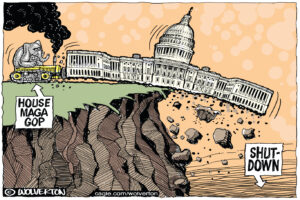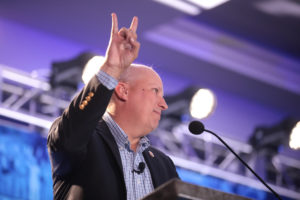The Budget Speaks Louder Than Pandering
Although President Bush recently feigned interest in income inequality and the deficit, his whopper of a budget makes it clear that his heart is still with his base: the haves and the have-mores.Although President Bush recently feigned interest in income inequality and the deficit, his whopper of a budget makes it clear that his heart is still with his base: the haves and the have-mores.
WASHINGTON — Somebody should get the president back into his white tie and tails.
It’s always a kick when President Bush goes to New York City, where the man from Crawford can sometimes look as out of place as he does on those rare occasions when he visits his family’s summer home in Kennebunkport. Last week Bush showed up on Wall Street, where year-end bonuses totaled an estimated $23.9 billion — up 17 percent from 2005, according to the New York state comptroller’s office — and the average payout topped $137,580.
For the first time, Bush uttered two words — “income inequality” — that are the hallmarks of our economic era. The assembled movers and shakers fell as silent as a Southampton sidewalk in February. But not to worry.
On Monday, Bush proposed a federal budget for the coming year that preserves his cherished tax cuts — the ones that help keep Wall Streeters’ wallets as pumped up as their egos — while hacking away at healthcare and other safety-net spending for the poorest citizens, including and especially poor children.
To be fair, Bush wasn’t as cynical in his New York speech as this juxtaposition makes it sound. The president never did pledge to do anything to start addressing the income inequality of which he suddenly is so aware. He merely told the chieftains before him to be more careful about their compensation. The nudge had no apparent purpose, other than to serve as a gentle reminder that those outsized executive pay packages look just awful, and are becoming potent as a political issue.
And the president took pains to point out that income inequality just isn’t his fault. Broad economic trends such as globalization and technological change that began more than three decades ago are the culprits. Which is true, to a point.
But that is the point where the white tie and tails come in.
Think back to the 2000 presidential campaign, when candidate Bush ventured to New York for the annual Alfred E. Smith charity dinner and political roast and seemed entirely at home. “This is an impressive crowd — the haves and the have-mores,” said the candidate, resplendent in his white tie. “Some people call you the elite; I call you my base.”
Now, after six years of the Bush presidency, if there is one thing we know for certain it is that Bush governs on behalf of his political base. Usually this is commented upon only when he uses the power of the White House to pander to Christian conservatives, as he did in vetoing legislation on stem cell research, or wholeheartedly joining in the bizarre spectacle of the Terri Schiavo case.
But there has been no greater pander than the one Bush has delivered to the have-mores: the tax cuts that, by any measure, have lavished far more benefits on the wealthy than on Americans of average means. One of the more rigorous analyses of the tax cuts’ effect, by the nonpartisan Tax Policy Center, shows that they’ll raise the after-tax income of those with incomes of $1 million or more by 6 percent this year. That’s nearly three times the gain in after-tax income to be felt by those roughly in the middle of the income spectrum.
Looked at another way, people at the top are to get a tax cut worth $119,517 in 2007 — while those in the middle are to receive about $1,163.
It’s awfully hard to imagine something less likely to reduce income inequality than a tax policy that consciously and consistently bestows its greatest rewards on those at the top. This is especially true now that Bush has discovered another cause he has heretofore ignored, reducing the deficit. In order to preserve all his tax cuts and extend them in perpetuity, finance two wars and boost Pentagon spending to levels Ronald Reagan could only dream about, Bush’s budget envisions slashing what’s left. That is, domestic programs in general and health insurance in particular — especially Medicare and Medicaid, on which the elderly and the poor rely.
Bush often gives lip service to public concerns — remember when he declared last year that America is addicted to oil? — then abandons the topic as suddenly as he brought it up. Now he has acknowledged “income inequality.” And he’s given us a budget of the sort he always promised: It is written by, and for, the men in white tie and tails.
Marie Cocco’s e-mail address is mariecocco(at symbol)washpost.com.
Copyright 2007, Washington Post Writers Group
Your support matters…Independent journalism is under threat and overshadowed by heavily funded mainstream media.
You can help level the playing field. Become a member.
Your tax-deductible contribution keeps us digging beneath the headlines to give you thought-provoking, investigative reporting and analysis that unearths what's really happening- without compromise.
Give today to support our courageous, independent journalists.






You need to be a supporter to comment.
There are currently no responses to this article.
Be the first to respond.